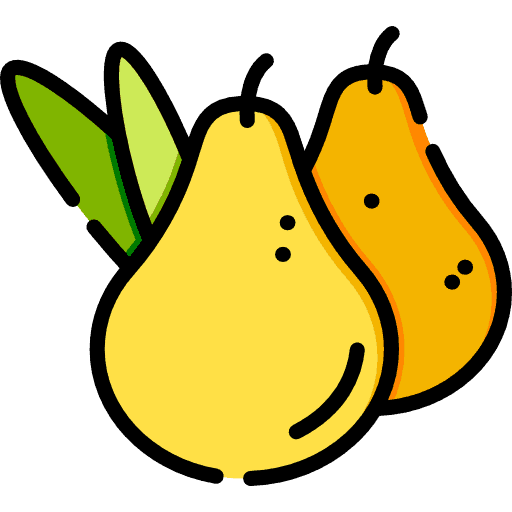Irritable Bowel Syndrome (IBS) is a common condition that is characterized by ongoing digestive symptoms.
It can greatly lower your quality of life, and in severe cases, can even prevent sufferers from leaving their home.
This article looks at the proven natural ways to get on top of your IBS and reduce your symptoms.
What is IBS?
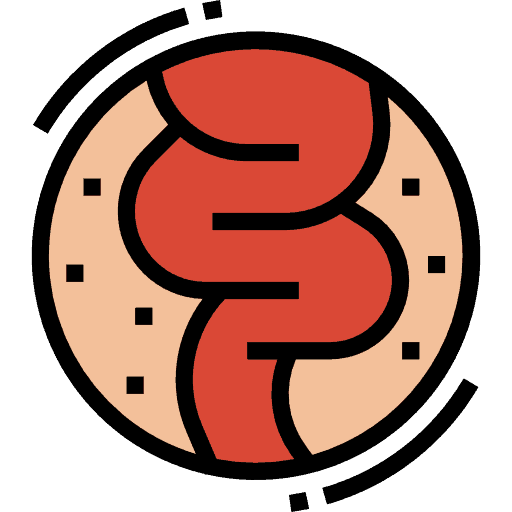
IBS is a chronic gastrointestinal condition.
Common symptoms include diarrhea, constipation, bloating, excess wind and stomach pain.
There are no adequate medical tests that can diagnose IBS.
A person’s symptoms and also the absence of other medical conditions are used to diagnose the condition.
How To Calm An IBS Flare Up
IBS flare ups can last from a few hours to several days.
There are many ways to quickly get on top of symptoms.
Implementing these strategies, plus letting time run its course, are the most effective ways to calm an IBS flare up.
Return To A Strict Low FODMAP Diet

The low FODMAP diet is a two-phase diet, and a scientifically-proven therapy to manage IBS (1).
The first phase of the diet involves removing foods that are rich in specific sugars (FODMAPs) that are likely culprits for IBS symptoms.
Once symptom control is achieved, each group of FODMAPs are re-introduced one at a time to identify which are responsible for that individual’s symptoms.
Many consider the initial strict version of the low FODMAP diet their safe diet.
It is a good idea to return to this baseline diet during a flare to let your symptoms pass.
Take Peppermint Oil
Peppermint oil is an effective remedy that can drastically improve IBS symptoms (2).
It is thought to work by relaxing the muscles found in the stomach and digestive tract, which can then speed up or slow down the motility of the GI tract (3, 4).
This results in relief from symptoms such as nausea, bloating, flatulence and altered bowel habits.
Use A Hot Water Bottle
Heat therapy can offer quick relief from painful IBS symptoms by relaxing the muscles in the GI tract.
Do Things That Will Help You Feel More Relaxed
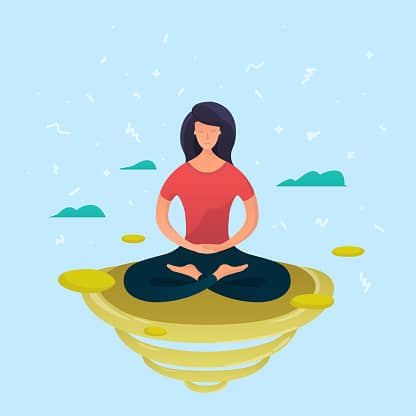
IBS sufferers tend to have an extremely sensitive gut that responds more easily to stress.
Trying strategies that make you feel more relaxed can reduce the sensitivity of the gut and help overcome your IBS symptoms faster.
Some relaxation methods include mindfulness meditation, yoga or even a gentle walk if you’re feeling up to it.
Treat Your Symptoms With Appropriate Supplements Or Medication
The most popular herbal supplement that also has scientific backing, is called Iberogast (5).
It contains a mixture of herbs that can assist abdominal pain, flatulence and altered bowel habits.
There may also be some over the counter medication that can help IBS symptoms.
It is best to discuss your needs with a pharmacist.
Summary: There are a number of strategies that could be used to calm an IBS flare up. Symptoms will also pass with time.
Want more information on how to start a low FODMAP diet for IBS?
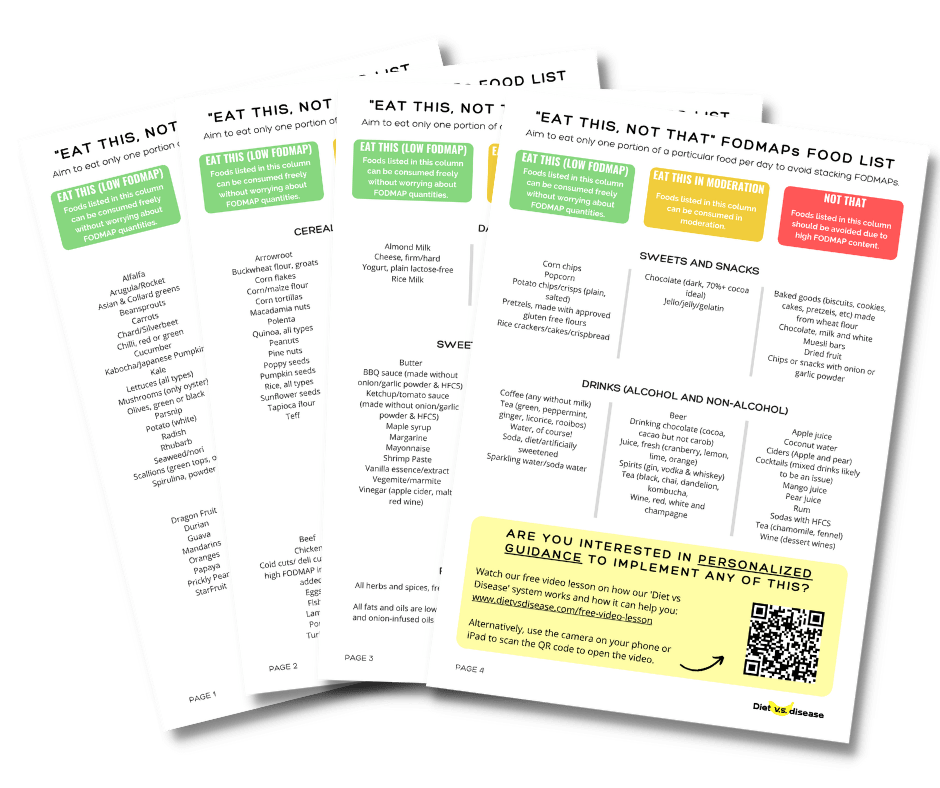
How To Cure IBS Naturally
There is no “cure” for IBS at the moment, however over the long term the symptoms can be managed effectively with a number of strategies.
Try The Low FODMAP Diet From Start To Finish
Continuing on from above, the low FODMAP diet contains two main phases.
The first phase reduces all high FODMAP foods to confirm a reaction to FODMAPs.
Then the second phase involves testing each FODMAP group one at a time to identify which groups you have been reacting to and at what level.
This second phase of the diet is arguably the most important part of the diet as it enables you to learn what your individual tolerance level is to different FODMAPs, and reintroduce some of your favourite foods as well.
Reduce Your Intake Of Known Gut Irritants
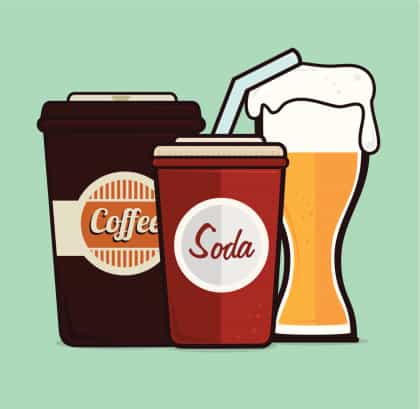
There are several known non-FODMAP triggers of digestive problems. These include:
- caffeine
- alcohol
- fatty foods and
- spicy foods
Removing these triggers from your diet can be an another way to effectively manage IBS in the long term.
More Or Less Fiber May Help
The evidence for the best type and amount of fiber in the diet is conflicting.
Some people are certain that a high fiber diet helps their symptoms, whereas others find a low fiber diet is more effective.
The type of fiber supplement that has the most research completed on it is psyllium husk (6).
Psyllium husk is a soluble fiber, meaning that it dissolves in water.
It soaks up water like a sponge to add bulk to loose stools, but also softens hard stools to help them pass easier.
Try The FAILSAFE Diet
The FAILSAFE diet is an alternative diet therapy that can be considered when the low FODMAP diet doesn’t provide good symptom relief.
It’s another type of elimination diet that aims to identify a sensitivity to particular natural food chemicals and artificial food additives.
Similar to the low FODMAP diet, there are two main phases that involve an elimination phase to confirm a reaction, followed by a reintroduction process.
Manage Your Stress And Anxiety

As mentioned earlier, people with IBS have an overly sensitive gut with unpredictable digestive symptoms.
This unpredictability is highly stressful and anxiety-provoking.
Yet, this stress and anxiety can make digestive symptoms worse.
It can be seen as an unpleasant feedback loop.
For this reason, practicing ways to manage stress and anxiety helps to keep on top of IBS symptoms in the long term.
Mindfulness meditation can be useful, as can yoga or some moderate exercise.
Psychological Therapies For IBS
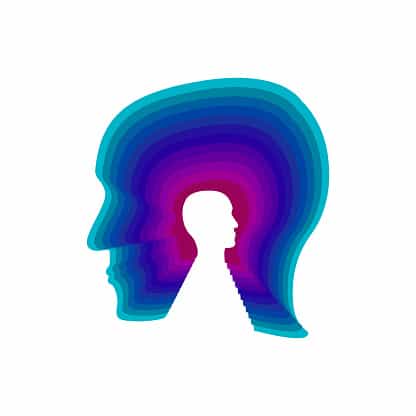
Continuing on from above, the gut and the mind are strongly linked.
If the mind is calm, then gut symptoms improve.
Thus, it makes sense that psychological therapies play an important role in keeping IBS symptoms to a minimum.
Psychological therapies include cognitive behavioural therapy and gut-direct hypnotherapy .
Try A Probiotic Supplement
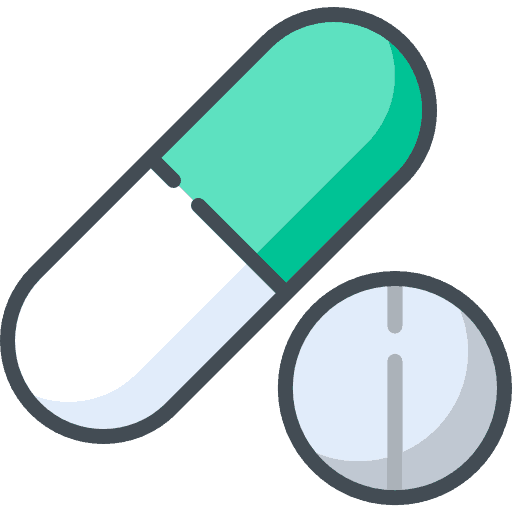
Probiotic supplements are a promising additional treatment option for those with IBS (7).
The term ‘probiotics’ refers to beneficial bacteria that we consume specifically for health benefits.
However, probiotic supplements are not created equal.
They vary in the strains they contain and the amounts.
A comprehensive review on the best probiotics for IBS can be found here.
Try Peppermint Oil And Other Herbal Remedies
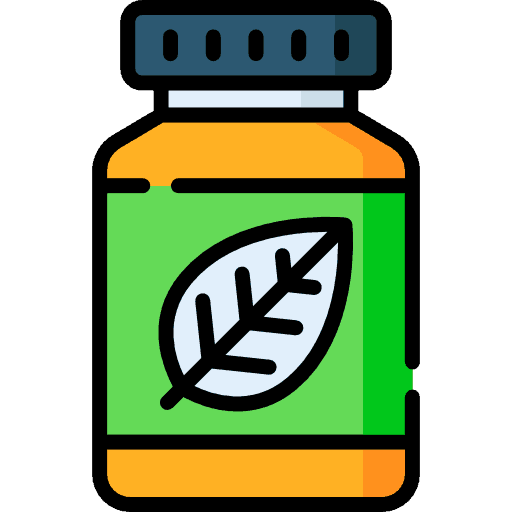
As mentioned earlier, ingesting peppermint oil and herbal remedies such as Iberogast are effective ways to manage a flare in IBS symptoms.
However, they may also be effective in managing IBS symptoms long term when taken regularly as a precaution.
Summary: To date, there is no cure for IBS. However, it can be managed over the long term with a number of diet and lifestyle strategies.
Effective IBS Treatment Is Achievable
While science is yet to uncover a cure for IBS, there are a number of short term and long term strategies that are effective.
IBS treatment starts with diet and lifestyle – minimising triggers, identifying food intolerance, and managing stress and anxiety.
There are also a number of additional strategies that can be used to manage IBS over the long term including a change in fiber intake, probiotics, and herbal remedies.
Want more information on how to start a low FODMAP diet for IBS?



